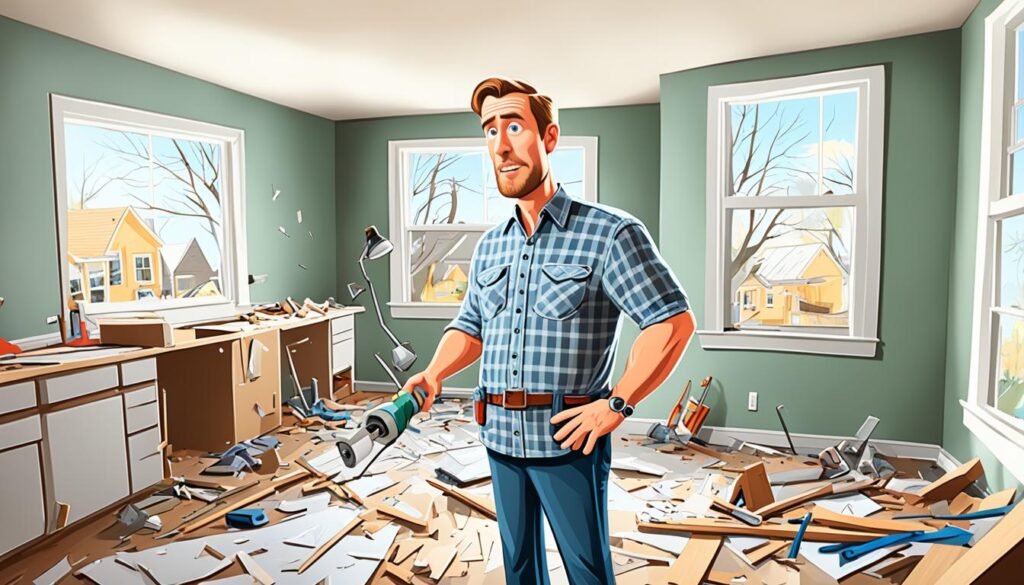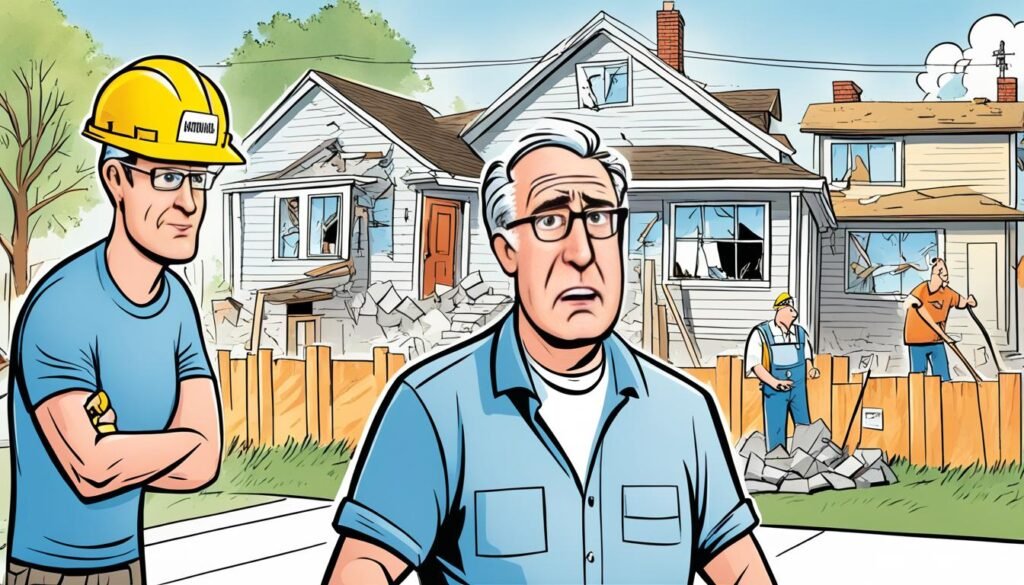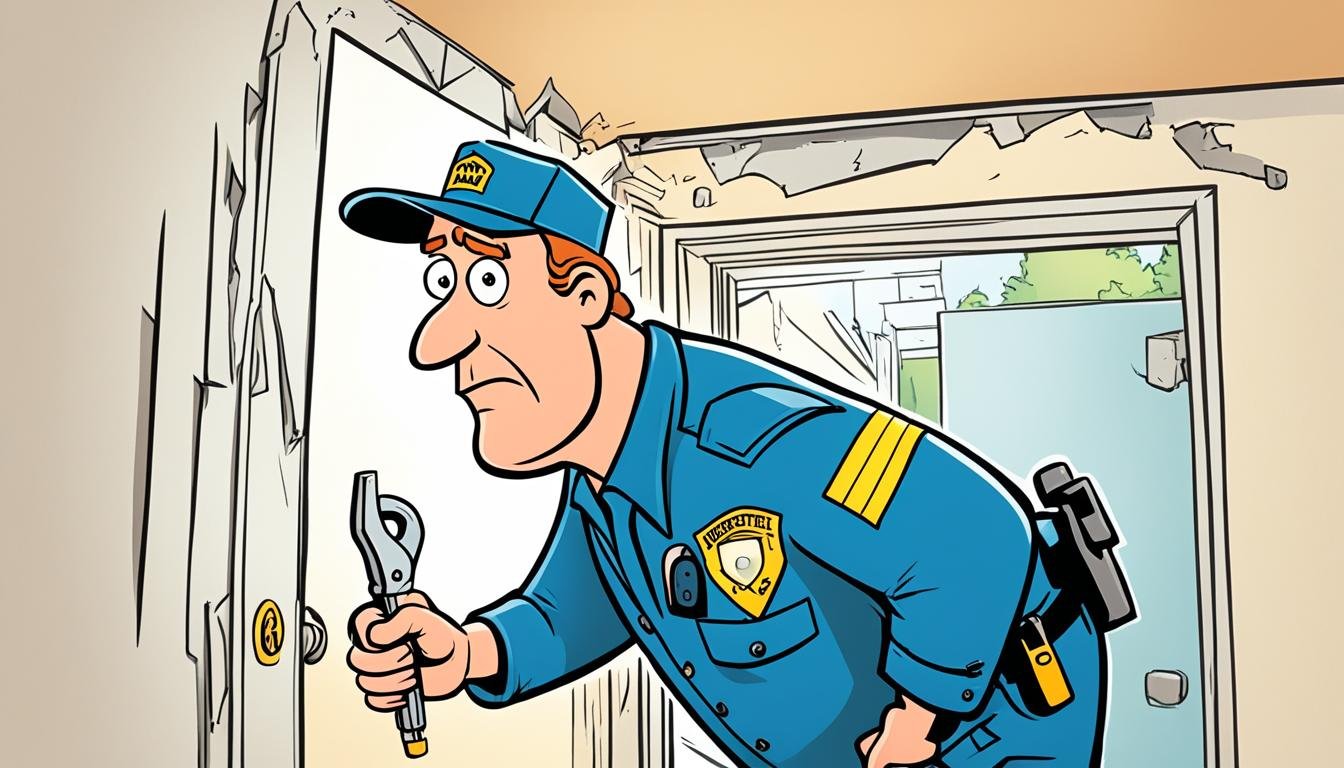Imagine if an inspector finds unpermitted work in your home. When selling, some worry about past changes made without permits. Such actions, such as updating electrical systems without the okay, can cause big trouble. You could face unpermitted renovation problems when selling. Whether it’s unapproved building work or unpermitted changes, you must get advice. This is especially true if you’re doing it on your own without a real estate agent. Remember, only 35 US states have rules for home inspectors. Learning your local laws is very important1.
Key Takeaways
- Unpermitted work includes any substantial home improvement done without the proper permits.
- Common examples include large-scale electrical or plumbing upgrades that miss municipal approval.
- Addressing unpermitted work is crucial as it can impact the sale and value of your property.
- Consulting with professionals who have dealt with similar situations is advisable before selling.
- Stay informed about your state’s home inspection laws, as only 35 states have specific regulations1.
Understanding Unpermitted Work: What It Is
Unpermitted work happens when big repairs or changes are done without the right city or town permits. This might be adding a room or changing the plumbing or wiring. Doing these things without permission can lead to big problems later on.
Common Examples of Unpermitted Work
Here are some examples of unpermitted work:
- Adding sunrooms or extra bedrooms
- Major electrical and plumbing upgrades
- Installing new windows without permits, which could cost over $6,000 if caught2
- Making structural changes without proper approval
Why Permits Matter
It’s key to get permits for many reasons. First off, they make sure everything is done safely. This keeps future problems at bay. For example, getting busted without the right permits might mean shelling out $4,750 for plumbing fixes2. Secondly, permits keep a good record of work done. This makes getting OKs for later projects easier.
Without permits, you could face tough issues like fines and unsafe homes. When selling, finding work without permits can really slow things down or turn buyers off in 70% of situations3. Plus, banks might not lend you money until all unpermitted work is taken care of to fit the rules in 85% of cases3

Common Causes of Unpermitted Work
Some people do their own projects at home to save money. They skip getting permits. Then, they break the law without knowing it. This can cause big problems later, like when selling the house.
Contractors can also mess up. They might not follow the rules. This is bad for the house. If inspectors find the problems, it could cause trouble. It’s smart to hire good inspectors when you buy a house to avoid this1.
“Errors and Omissions (E&O) insurance is often required for home inspectors to safeguard against professional errors, emphasizing the critical nature of identifying and addressing unpermitted work1.”

Not getting if we need a permit can cause problems. This is more common with big changes to the house. It can slow down getting a loan. This is because the house’s value might not be what it seems without these changes approved4.
Finding out who is to blame for the unpermitted work is important. Making sure the house is up to standard is key. This helps reduce the risk of problems later1.
Doing things to fix these issues early on makes a big difference.
| Common Causes | Repercussions |
|---|---|
| DIY Projects | High risk of unpermitted remodeling repercussions |
| Contractors Ignoring Codes | Inspector findings unpermitted work, leading to legal and financial consequences |
| Misunderstanding Permit Needs | Potential issues during loan approval and property transactions |
Signs You Might Have Unpermitted Construction
It’s key to watch for signs of unapproved building work at home. Catching this early can avoid big fines for unauthorized changes.
Visual Clues
First, look at your home. See if anything looks odd or different. Things like strange walls or windows, wrong paint colors, and odd additions stand out. For example, a sunroom that looks different could mean it wasn’t approved.
Consulting Blueprints
Checking your home’s original plans can also help. Compare what’s there now to the old blueprints. Finding new rooms or different layouts suggests someone changed things without permission. Knowing this can confirm if work was unallowed.
Checking City Records
To be sure about any hidden changes, check city documents. Look for permits online or talk to your local building department. Only 35 US states demand inspectors to be trained and licensed, allowing a time limit of a few years to over five for spotting these problems1. Home inspectors in many states also need Errors and Omissions insurance to cover professional errors1. By doing this, you might find errors that point to unapproved work.
Following these steps is crucial to avoid penalties for unpermitted changes. Finding out about unauthorized work early can help prevent later issues and legal troubles.
What Happens if an Inspector Finds Unpermitted Work Junk Home Buyers LLC
An inspector finds unpermitted work in your home. It’s important to take quick steps to fix this. Know the local building authority’s role to get through this well.
Immediate Actions to Take
First, get a pro’s evaluation of the unpermitted work. They might suggest more detailed checks if needed1. This is key to stop bigger issues early.
Potential Legal Consequences
Facing legal troubles is a big worry with unpermitted work. You could get hefty fines or even legal orders. These might include paying to fix or remove the unpermitted work. The time limit to blame an inspector varies and can last up to several years1.
Involvement of Local Authorities
Local building authorities must know about the unpermitted work. They might ask you to get permits after the fact and check it all over. Inspectors keep things safe and follow the rules5. Sometimes, they’ll need to see parts of the work which could cause more costs. Rules differ by area, so knowing your local law is important6.
Act fast and work with the inspector to fix the unpermitted work issue. Speaking to the local building authorities can make things smoother. This helps your house meet safety and regulatory levels.
First Steps to Take When Unpermitted Work is Discovered
Find-out about unpermitted work, and you might feel upset. But don’t worry, acting fast and smart can help. Let’s look at what to do next:
Contacting a Professional for Evaluation
Talk to a licensed contractor first. They will check the work that was done without a permit. They know all about building codes and can see hidden problems. Things like bad wiring or shaky structures might be found17.
Communicating with Local Building Authorities
After the check-up, call the local building authorities. They’re the ones who give out permits. They will guide you through getting the right ones. These could include building permits, or electrical and plumbing permits7. Fixing the work without a permit means you’re following the rules. This stops you from getting in trouble or paying more later.
Fill out the needed paperwork with help from your contractor. Some places ask for Errors and Omissions insurance. It helps if something goes wrong during the permit process1. Getting this right now can stop big costs later. No one wants to have their house torn down because of a mistake8.
Potential Consequences of Unpermitted Work
Building without the right permits can cause big problems for homeowners. There could be fines and you might need to fix things to follow the rules. If your home is not up to code, selling your home or doing big changes can be hard. This is why it’s really important to get the right permits before you start any work.
If you don’t follow the rules, selling your home can get tough too. You must tell buyers about any big problems, like broken roofs. If you don’t, they might not trust you. They could also find out about past water damage or bugs. This could stop them from wanting your home.
Doing work without permission can cause trust issues with the people you need to trust. For example, you need to be honest about how much electricity your home has. If not, it can lead to fights. Even the people who check your home might get involved. So, always be open and honest about the work you have done.
If you hide changes to your home, buyers might think twice about buying it. This can lead to disagreements and slow down the process of selling or buying a house. Also, insurance might not cover a home with hidden problems. So, it’s better to be upfront and fix these issues before they cause bigger problems.
Illegal changes can also lower your home’s value. You might sell it for less or struggle to find a buyer. To avoid these problems, make sure any work you do is approved. This will save you a lot of trouble in the future9.
Options for Handling Unpermitted Work
Have you found unpermitted work on your land? Don’t worry, there are a few good ways to deal with it. You can choose the best route to make things right.
Retroactive Permitting
Applying for retroactive permits is a good first step. This means getting the proper paperwork for the work done without permission. Those selling their property may need to do repairs and show all documents4. This ensures the work meets today’s standards. It can help with future selling and makes your home a better buy.
Selling the Home As-Is
Selling the house just as it is can be an easier choice. This is true if fixing or permitting the work is too hard or costs too much. Unpermitted work can cause problems with selling the home10. Awakened Property Buyers buy homes with work still to be finished. They offer cash even if it’s not done right11. This can be better than working with a real estate agent, especially for homes with work still to do11. Just know, selling as-is means you may get less money but sell faster.
Demolishing and Rebuilding
If the unpermitted work is big or unsafe, start fresh might be the best idea. This way, the building meets today’s safety and quality rules. It also avoids legal problems of selling a place with hidden work. In rural areas, you need to follow government rules on building, zoning, and land use4. While this is a big step, it can calm your worries and improve the property’s value over time.
The Costs of Retrospective Permitting
Dealing with unpermitted work’s money issues is tough. Getting those late permits can be hard for homeowners. This brings in a lot of costs and hurdles.
Direct Costs
The direct costs are the permit’s fees. They’re figured out from the job’s cost, which includes workers and materials12. If work was stopped with a red tag, fees might double and you could be fined12. In Salt Lake City, people can apply for permits online. But, it doesn’t change the costs12.
Indirect Costs
Fixing unapproved work can mean updating these old changes to today’s rules. This could be moving and putting back electrical or plumbing to be safer. In some cases, if it’s urgent, the rules might be more flexible. But, you still have to check with today’s laws12. Not following the rules can cost a lot more in the future.
Hiring an Architect or Contractor
Homeowners might need to hire architects or contractors to fix the unpermitted work right. Contractors take care of getting permits, checking with building codes, and handling inspections. This just adds more to the bill12. Inspections may need parts of the place to be opened up. This is to let the city check, costing more money12.
| Cost Element | Example Expenses |
|---|---|
| Permit Fees | $200 – $1500 depending on project value12 |
| Double Fees (RED TAG) | Potentially up to $300012 |
| Architect/Contractor Fees | $500 – $2500 depending on scope |
| Inspection Costs | $100 – $500 per inspection visit12 |
It’s very important for homeowners to know the costs of fixing unapproved work. Getting the right experts and following local rules can lower these dangers. It can keep your place up to code and in good financial shape.
Impact on Home Sales and Property Value
Unpermitted work can scare off buyers because they might worry about extra costs or legal issues. Fixing unauthorized changes to meet the law is expensive. Also, handling appraisals can be a challenge. They often come late and need more review, slowing things down13. This unapproved work can make buyers offer less money or make the buying process long.
It’s important to mention bad stuff like radon, asbestos, or lead in the house. Hiding these health dangers could mean big trouble. It might even stop the sale completely, bringing everyone more problems and costs9. Also, doing work without permits can mean the house sells for less. This can ruin the house’s image and make selling it later hard9. If sellers don’t talk about known problems, they might face legal trouble and more costs9
Checking the house before selling it can prevent bad surprises. It is suggested for sellers to get their house looked at before putting it up for sale. This can help fix issues early and make selling smoother13. Some places even want sellers to check before selling. This is to catch and solve any problems with permits, making the sale easier13. Things like bad foundations must be told to buyers for their safety9.
Unpermitted work can drop the house’s value and make it not follow local laws. Not telling about these changes can drop the house’s charm and price. This might lead to fights with buyers later9. So, fixing unpermitted work fast is the best way to avoid these issues. It makes selling the house smoother and more profitable.
How to Sell a Home with Unpermitted Work
Selling a home with unpermitted work might seem hard. But, with the right steps, you can do it well. Tell buyers about any unpermitted work to be open and build trust. This helps you legally and makes the sale fair for everyone.
Disclosing Unpermitted Work
Be sure to let buyers know about any unapproved changes to your home. You can talk about it, write it down, or show it in listings. This honesty stops surprises and lets buyers decide wisely2. Homeowners must share any issues they know about, like wrong plumbing, that would affect a buyer’s choice.
Setting the Right MP
Deciding the price for a home with unapproved changes is tricky. Think about the extra costs buyers might face to make things right. Getting permits for these changes could be about $6,000. Fixing any issues could cost $10,000 to $20,000 more2. These costs should be part of the final price. It should match the home’s true value.
Marketing Strategies
Good marketing shows off the home’s best parts and deals with unpermitted work honestly. Use great photos, clear descriptions, and virtual tours. Talk about how you might get retroactive permits. Or, offer a plan to make things right. Focus on the good things, like the area and the design. This can help pull in buyers willing to fix the issues.
Source Links
- https://www.ahit.com/home-inspection-career-guide/how-long-is-a-home-inspector-liable/
- https://www.reddit.com/r/legaladvice/comments/nfujoe/undisclosed_plumbing_issues_and_mass_unpermitted/
- https://www.pdxhomeworks.com/permit-requirements/
- https://www.rd.usda.gov/files/3550-1chapter05.pdf
- https://www.doityourself.com/forum/electrical-ac-dc/115800-permit-pros-cons.html
- https://www.diychatroom.com/threads/getting-permitted.726768/
- https://www.angi.com/articles/who-pays-if-contractors-dont-pull-permits.htm
- https://www.dirtconnections.com/real-estate-home-inspections-permits/
- https://www.forbes.com/sites/terriwilliams/2024/02/29/when-selling-your-home-dont-try-to-conceal-these-problems/
- https://www.momentumpropertysolution.com/blog/the-truth-about-selling-a-house-with-code-violations/
- https://www.awakenedhomebuyers.com/blog/how-to-sell-your-home-in-lancaster-with-unfinished-or-unpermitted-construction/
- https://www.slc.gov/buildingservices/building-permits/faqs/
- https://domicileconsulting.com/real-estate-deal-killers-and-how-to-avoid-them-zillow-com

